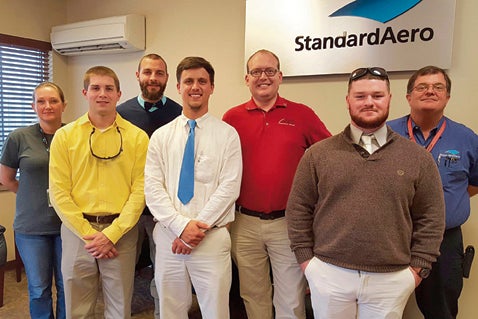SGTC aviation students interview for co-op positions with Standard Aero
Published 1:15 pm Saturday, January 30, 2016

- From left are Jessica Rivers, Senior Human Resources generalist at Standard Aero; SGTC aviation students Andrew Cochran, Mitchell Hobby and Robert Albriton; SGTC aviation maintenance technology instructor Stephen Griffin, SGTC aviation student Daniel Warford, and Chris Jones, crew chief at Standard Aero.
AMERICUS — South Georgia Technical College (SGTC) aviation maintenance technology students recently interviewed for co-op positions at Standard Aero in Augusta. Aviation maintenance technology instructor Stephen Griffin accompanied students Mitchell Hobby of Americus, Robert Albriton of Ellaville, Daniel Warford of Yatesville, and Andrew Cochran of Ellaville to the interviews. Griffin and the students met with Standard Aero Human Resource Generalist Jessica Rivers and Crew Chief Chris Jones.
SGTC and Standard Aero began a partnership in 2012 that created a Cooperative Education employment program for SGTC Aviation students. The Co-op Program is a planned, progressive educational program that provides for the integration of a student’s academic studies and work experience with the potential for conversion into regular employment with the company upon completion of an Airframe and Powerplant Certificate.
Previously operated as Garrett Aviation, Standard Aero’s Augusta facility houses one of North America’s most capable jet services facilities. For over 30 years the Augusta operation has served the corporate aviation community. With over 185 technicians, each averaging 15 years of employment at Augusta, they can perform virtually any maintenance event — scheduled or unscheduled. Standard Aero is an authorized service center for Bombardier Challenger, Dassault Falcon Jet, and Honeywell TFE-731 and TPE 331 engines, and Honeywell 36 series APUs.
In order to qualify for the co-op program with Standard Aero in Augusta, students must be at least 18 years old, a U.S. citizen, meet the company’s policy on nepotism, and safety and job requirements as well complete pre-requisite courses and/or credit hours in the applicable curriculum with a minimum cumulative 2.5 GPA.
Students must also be enrolled in and recommended by an accredited school. The students will be paid and work 40 hours per week on a six-month rotation. Each work experience must be directly related to student’s academic studies and career goals and be designed to provide the minimum number of study-related work hours. Students’ academic and on the job evaluations will be performed after each rotation.





